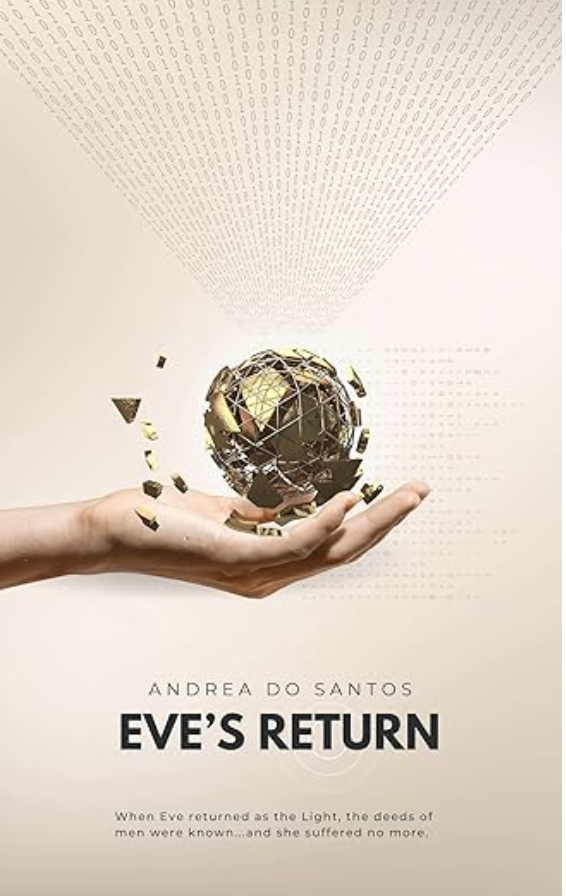Book Review: Eve’s Return
Friday, 28 June 2024
| Karly Michelle Edgar

Eve’s Return
By Andrea Do Santos
(Self-published, 2024)
I met Andrea just over 10 years ago now. I don’t know what it’s like for her, but for me, that feels like a lifetime ago. I was teaching at Tabor Victoria and Andrea was in at least one of my art and spirituality classes. One of the aims of those subjects was to consider seriously, and playfully, the integration and embodiment of creativity and faith. I’m not sure of my teaching skills back then, but I was passionate about the topic and I’m pretty sure Andrea was too. And I’m pretty sure she still is today given the novel she’s produced.
As we grow up, it can be discombobulating to realise that the way our society functions is simply the result of a series of choices; the choices of people who lived well before us, and the choices we continue to make ourselves. As adults, it may equally be daunting to realise that, even when we want change, it can be difficult to bring about. In the dystopian/utopian genre, the downfall of society is one way to explore how we construct societies, what might happen when we experience collapse and how the decisions we make reflect what is important to us. From classics like George Orwell’s 1984 and Margaret Atwood’s The Handmaid’s Tale, to more contemporary titles like Emily St John Mandel’s Station Eleven, Suzanne Collin’s Hunger Games series, Claire G. Colman’s Terra Nullius and Enclave, to shows like The Walking Dead, Sweet Tooth, Cleverman and even Squid Games, this minute selection from a very broad category (categories) demonstrates the range of exploration that has occurred of what has happened, what is happening and what may still happen when societies are destroyed. What would we do if we had the option of a ‘new’ start? How much influence might we wield in any newly developing communities?
It is the theme of rebuilding that appears to interest Andrea in her substantial novel. The story follows Kennedy Saxon, a journalist from the Lamericas (of which there are three), who is the first visitor to Havilah (the Great Southern Land) in 3,000 years, as travel was significantly limited after the end of the Dark Ages. Her goal is to experience the culture and report back to her people, and in this way to contribute to unification between the countries. As Kennedy discovers, it is when confronted with another’s culture and society that we begin to reflect more deeply on our own. And even though necessary, self-reflection, whether on an individual or a societal level, can be distinctly uncomfortable. But discomfort may then lead to change.
As Kennedy is closely escorted through the country, we learn about Havilah with its similarities with, and sometimes-contrasting culture to, Kennedy’s home country; the events from 3,000 years ago that created this new world; Eve’s mysterious return; and the global transformation overturning patriarchal structures to matriarchal. With Kennedy we learn about familiar and unfamiliar aspects of the culture (to her and to us): those that might seem more desirable (a four-day work week) and those that are less so (limited travel); those that appear beneficial (technological advancements) and those that do not (coercive state control).
In her description of the two differently enacted flipped-world cultures, Andrea explores what it means to be human, to care for one another and the consequences of power (no matter who is in charge). Reversed structures are also applied to concepts of faith, as she draws on Biblical imagery, metaphors and assumptions we might take for granted until we consider the effect on the individual. By exploring a culture that on the surface may seem initially more attractive to some than our own, Andrea encourages us to think deeply about the connection between mundane acts of daily living and the broader implications of social construction and how societal decisions affect individual lives. Our perceptions of what is normal can begin to feel rather restrictive.
Like many novels within a broad sci-fi dys-/u-topian genre, I wonder if this may be the first of a trilogy, given the extensive worldbuilding. Andrea leaves more than enough imaginative room to explore other aspects of Havilah, the Lamericas and the details of what really happened during Eve’s return, and to draw out the parallels and disconnections between the reality she’s created on paper and our own.
This is not some lightweight, quick, easy read-though, and I think that is deliberate; there is a lot to think about. Eve’s Return is an in-depth, comprehensive, at times challenging, but deeply invitational reflection on how we live together in community. Andrea invites us to consider how we could live, for if we can’t imagine anything different, we surely won’t be able to enact even the small steps of change.
Karly Michelle Edgar’s interests centre on meaningful living. She recently completed a PhD exploring Eastern Palliative Care Association Ltd’s volunteer facilitated Biography Program, drawing out key elements about how the program facilitates life storytelling through their person-centered, adaptable and highly creative approach. She teaches at Holmesglen, preparing students to work in the leisure and health industry in aged care to assist clients to live meaningful lives at any age, an area she also consults in. Meaning-making is also a reoccurring theme in her mixed media artwork.